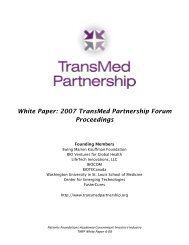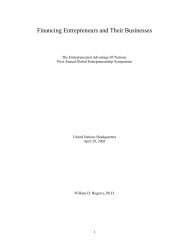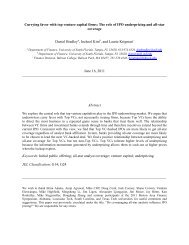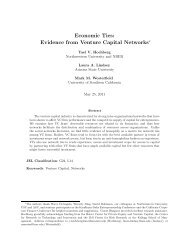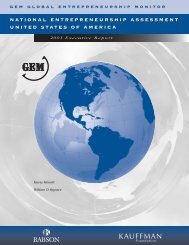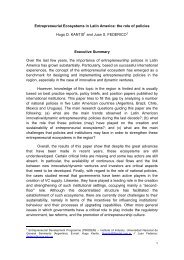Financing Child Care in the United States - Ewing Marion Kauffman ...
Financing Child Care in the United States - Ewing Marion Kauffman ...
Financing Child Care in the United States - Ewing Marion Kauffman ...
You also want an ePaper? Increase the reach of your titles
YUMPU automatically turns print PDFs into web optimized ePapers that Google loves.
PUBLIC–PRIVATE PARTNERSHIPS EMPLOYER AND PUBLIC SECTOR PARTNERSHIPS<br />
POPULATION SERVED<br />
Employed women who become unable to work as a result<br />
of pregnancy, and who were covered by a TDI plan, may<br />
file for TDI benefits.<br />
STRATEGIC CONSIDERATIONS<br />
• The benefits available under TDI, though very limited,<br />
can be an important source of support for unemployed<br />
mo<strong>the</strong>rs with low to moderate <strong>in</strong>comes. When<br />
comb<strong>in</strong>ed with accumulated vacation and sick leave,<br />
TDI benefits can help a mo<strong>the</strong>r to stay home with her<br />
newborn child for several months.<br />
• Partial wage replacement under TDI is an <strong>in</strong>expensive<br />
way to support parental leave, and one that allows <strong>the</strong><br />
cost to be shared by employers and employees. It<br />
helps to keep many low–<strong>in</strong>come women off welfare<br />
and has not caused a significant economic stra<strong>in</strong> on<br />
employers. Although <strong>the</strong> New Jersey TDI claims load<br />
has <strong>in</strong>creased, <strong>the</strong> fund has rema<strong>in</strong>ed solvent due <strong>in</strong><br />
part to <strong>the</strong> fact that <strong>the</strong> taxable wage base is adjusted<br />
each year with <strong>in</strong>creases <strong>in</strong> <strong>the</strong> average weekly wage.<br />
Interest <strong>in</strong>come on <strong>the</strong> fund also contributes to its<br />
solvency.<br />
• The cost of TDI benefits is considerably less than <strong>the</strong><br />
cost of subsidiz<strong>in</strong>g <strong>in</strong>fant care for low— and moderate—<br />
<strong>in</strong>come families.<br />
• Small–scale employers are particularly benefited by <strong>the</strong><br />
New Jersey approach to TDI. In 1952, 72 percent of<br />
employees and 36 percent of covered employers were<br />
covered under private plans. Over time, however,<br />
smaller employers found that it didn’t pay to have a<br />
private plan, and some private <strong>in</strong>surers found it was not<br />
profitable enough to compete with <strong>the</strong> state. More and<br />
more employers enrolled <strong>in</strong> <strong>the</strong> state plan. By 1994,<br />
only 21 percent of covered workers and 3 percent of<br />
covered employers used private plans. In 1998, 19<br />
percent of employees and 3 percent of employers<br />
were covered under private plans.<br />
• There are real limitations to what TDI can do. TDI is<br />
currently limited to a pregnancy–related “disability” that<br />
is corroborated by a physician. It may not be used to<br />
care for a newborn or an adopted child, and cannot be<br />
used by a fa<strong>the</strong>r or o<strong>the</strong>r family member (s<strong>in</strong>ce by<br />
def<strong>in</strong>ition, <strong>the</strong>y did not become “disabled” by <strong>the</strong><br />
pregnancy). The New Jersey Legislature, however, is<br />
currently consider<strong>in</strong>g legislation that would extend TDI<br />
coverage. A 1577 is a pure TDI plan that would provide<br />
replacement <strong>in</strong>come for family members who must<br />
leave employment temporarily to care for a newborn or<br />
newly adopted child, or a seriously ill family member.<br />
An alternative measure, A 2037, would provide TDI<br />
coverage for a family disability and Unemployment<br />
Insurance for birth and adoption.<br />
OTHER SITES WITH SIMILAR STRATEGIES<br />
At least five states <strong>in</strong> addition to New Jersey have<br />
temporary disability <strong>in</strong>surance programs: Rhode Island<br />
(funded by employee tax); California (funded by employee<br />
contributions); New York (funded by employer tax or jo<strong>in</strong>t<br />
employer/employee contributions); Puerto Rico (funded<br />
by employers and employees), and Hawaii (funded by an<br />
employer and employee tax). Additionally, more than half<br />
of all workers <strong>in</strong> <strong>the</strong> <strong>United</strong> <strong>States</strong> receive TDI benefits<br />
from <strong>the</strong>ir employer through private <strong>in</strong>surance plans.<br />
CONTACTS<br />
Gregory L. Williams<br />
Senior Research Associate<br />
New Jersey State Legislature<br />
Office of Legislative Services, Central Staff<br />
State House Annex, CN–068<br />
Trenton, NJ 08625<br />
Phone (609) 984 0445<br />
Fax (609) 777 2998<br />
143




